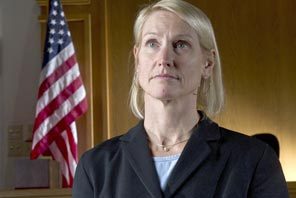Originally published Tuesday, January 24, 2012 at 7:39 PM
Tiny office says it can save state money on sex-offender defense
Washington has extensive problems with the legal bills of sex offenders who face indefinite lockup at the Special Commitment Center on McNeil Island. The state Office of Public Defense says it could save taxpayers $1 million annually if it took over defense costs statewide.
Seattle Times staff reporter
DEAN RUTZ / THE SEATTLE TIMES
PRICEY CASES: David Hackett, King County prosecutor in charge of civil-commitment cases, hopes the Legislature takes action this year.
Part One: Expert Costs
State wastes millions on sex-predator legal bills
Sex offenders' legal costs were kept secret from public
Timeline: Evolution of Washington's troubled civil-commitment program
Graphic: How a sex offender gets committed to McNeil Island
Expert costs: source documents
Part Two: Predator Island
Waiting on predator island: Chronic delays drive up cost
Sex offenders could get trials annually, driving up the legal bills
U.S. map: Where sex predators are detained
Predator island: source documents
Part Three: Worst Case
Swayed by a psychologist, jury frees 'monster' who attacks again
Part Four: Challenges
Tiny office says it can save state money on sex-offender defense
![]()
A tiny, little-known state agency says it can save the state $1 million a year by overseeing defense costs for Washington's troubled civil-commitment program that locks up the most dangerous sex offenders.
The state Office of Public Defense (OPD) said providing centralized financial oversight and eliminating hourly billing by defense attorneys would lead to the savings.
The report, released last month, echoes some of the findings by The Seattle Times in its Price of Protection series. The Times found the state has little control over its $12 million a year in legal bills spent to keep sex offenders detained beyond prison. Offenders facing civil commitment routinely postpone their trials for years, driving up costs and wasting state money, The Times also found.
State lawmakers, pressed to close a $1.5 billion budget shortfall, will consider OPD's proposals during the legislative session.
"We're trying to get a handle on the legal costs in a way where we are balancing people's right to justice with the fact that it looks like there is both abuse there and it's an insane use of resources," Rep. Ross Hunter, D-Medina, chairman of the House Ways and Means Committee, said Tuesday.
David Hackett, King County prosecutor in charge of civil-commitment cases, said he hopes the Legislature takes action this year.
"Every year you don't act, it's a million dollars you've lost," he said.
Under Washington's civil-commitment law, the state can indefinitely detain sex offenders who are deemed by a judge or a jury to be too dangerous to set free. The offender has a right to a defense team, which is almost always funded by public money. If deemed a predator, the offender is sent to live at the Special Commitment Center on McNeil Island.
Legal costs eat up about one-quarter of the center's $50 million budget each year.
Today, the Department of Social and Health Services (DSHS) pays for the legal and expert costs, but has little control over them. Local judges authorize expenditures, then the invoices funnel through a statewide web of county officials, ending up at DSHS for reimbursement.
DSHS cannot track the legal costs of individual sex offenders nor completely monitor the spending.
Lawmakers last year asked the OPD to study the payment system and make recommendations.
The agency said one way to save $1 million a year would be to create annual contracts with attorneys who would each make up to $98,000.
Sen. Debbie Regala, D-Tacoma, one of several lawmakers on OPD's advisory board, said she will introduce a bill Thursday that supports this option. "It moves us forward to more accountability," she said.
Many opinions
A different cost-saving approach, the OPD said, would be for it to hire up to 24 lawyers and several support staff to do all the defense work statewide, paying them salaries similar to those who litigate commitment cases for the Attorney General's Office.
This could cut costs by $1 million a year, OPD said, because it would eliminate the current system of paying public defenders and contract lawyers by the hour, which "is rare in other types of public defense cases."
Some public-defender associations and the Washington Association of Criminal Defense Lawyers oppose the plan.
"In the case of King County, these attorneys are among the most experienced SVP (sexually violent predator) defense attorneys in the entire state, and it would be wasteful in the extreme to start over with new hires for a proposed government agency," Teresa Mathis, the association's executive director, wrote in response.
To help in OPD's review, researchers at the independent judicial agency piggybacked some of The Times' public-records requests.
Kelly Cunningham, superintendent of the Special Commitment Center, which is overseen by DSHS, said he supports a proposal that takes paying the bills out of DSHS' hands. He pointed to a conflict of interest: DSHS detains and treats sexually violent predators at the same time it pays defense lawyers and experts to set them free.
"It's inappropriate for us to be handling that money," he said.
Tracy Guerin, DSHS' chief of staff, said the agency doesn't want to give up paying the bills and will look for similar ways to achieve those savings.
"We can look at how to manage it differently here at DSHS," she said. "If they can save a million dollars a year and if we can't say the same thing, then we want what's in the taxpayers' best interest."
The report did note that "lengthy case delays at every stage of the process" contribute to higher defense costs, but didn't offer a specific solution. Last year, a bill to cut down on court delays was introduced, but it stalled after judges opposed it.
Pushing the limits
In the spring of 2010, DSHS first tried to limit what a forensic expert could charge for an evaluation of an offender to $10,000. It brought this action after Cunningham and his staff at the center found questionable amounts going to experts.
Civil commitment hinges on such experts, usually psychologists who give predictions about whether a offender might commit another violent sex crime in the future. Until last summer, experts have been able to charge any amount, with hourly rates reaching more than $430.
When the state tried to limit fees, experts and defense lawyers fought back. Several forensic psychologists across the country said Washington's cap would lead to incomplete and sloppy evaluations.
Others, such as psychologist Karen Franklin of California, said they would not take any future cases in Washington.
"This proposed change would cut so deeply into my earnings that — on top of all of the other unbilled hours that I put into a case — I would have a hard time breaking even," she wrote to DSHS.
The Defender Association (TDA), which represents dozens of King County sex offenders facing indefinite lockup, also objected to the fee limits.
The rules took effect Aug. 1, 2010, but the association sought a temporary restraining order the next day to prevent the state from instituting the caps.
"The rules will create actual and substantial injury to the Defender Association and its clients," wrote Leslie Garrison, an association attorney at the time.
When state officials realized they could face a courtroom battle, they rescinded the rule changes within days.
"There was extreme push back, so extreme that it caused us to slow down," Cunningham said.
Last spring, DSHS again proposed the $10,000 limit, but faced heavy opposition when it asked for feedback.
"This kind of cap would encourage superficial digestion of the facts by the experts evaluating a person facing an indefinite commitment process," Kenneth Chang, attorney at TDA, wrote to DSHS.
Another attorney who represents offenders in these cases, Michael Kahrs, said the rule changes were more about DSHS trying to save money than making sure clients received a proper defense.
"I question DSHS' neutrality in this area," he wrote to the agency. "It is in DSHS' interest to limit expenditures in this time of belt-tightening."
The DSHS in June capped expert evaluations of offenders, for both the state and the defense, to $10,000. It also limited hourly rates to $200 an hour, with travel reimbursed at $150 and testifying at $250.
The new rule also takes into consideration that some cases may be more complex and require more work; a psychologist can get paid more than $10,000 for an evaluation if a judge approves.
Some, including Brooke Burbank, state assistant attorney general in charge of commitment cases, have doubts the caps will work.
"Whether it will work in practice remains to be seen," she said. "Quite frankly, the practice is that the state experts are held to those limits and the defense experts go to court and can get a judge to override it."
The caps have had an impact already, though perhaps not one DSHS expected.
Richard Wollert, a Vancouver, Wash., psychologist, worked for the defense, evaluating a sex offender in a Clark County case. He already had been paid $12,213, but had yet to provide a report, records show. Told by the judge that his fee would be limited to $10,000, Wollert quit. Another psychologist had to be hired to finish the evaluation.
Wollert has made $1.2 million over a two-year period as a defense expert here and in other states.
Richard Packard, a Bainbridge Island forensic psychologist who has worked for both the state and defense, said the $10,000 limit for evaluations "will result in resentment, an unwillingness to work on difficult cases."
He recently evaluated a sex offender and turned in a bill for $15,700. After the state paid its $10,000 limit, Packard billed the remaining $5,700 to the King County Prosecutor's Office. It has refused to pay.
Psychologist Robert Halon, of California, who is working on about 30 cases in Washington as a defense expert, threatened to quit in the middle of a case because of the limits. When interviewed recently, he said he changed his mind about the caps.
"I think they are fair," he said. "I think they had to do something."
Christine Willmsen: 206-464-3261
On Twitter @Christinesea















